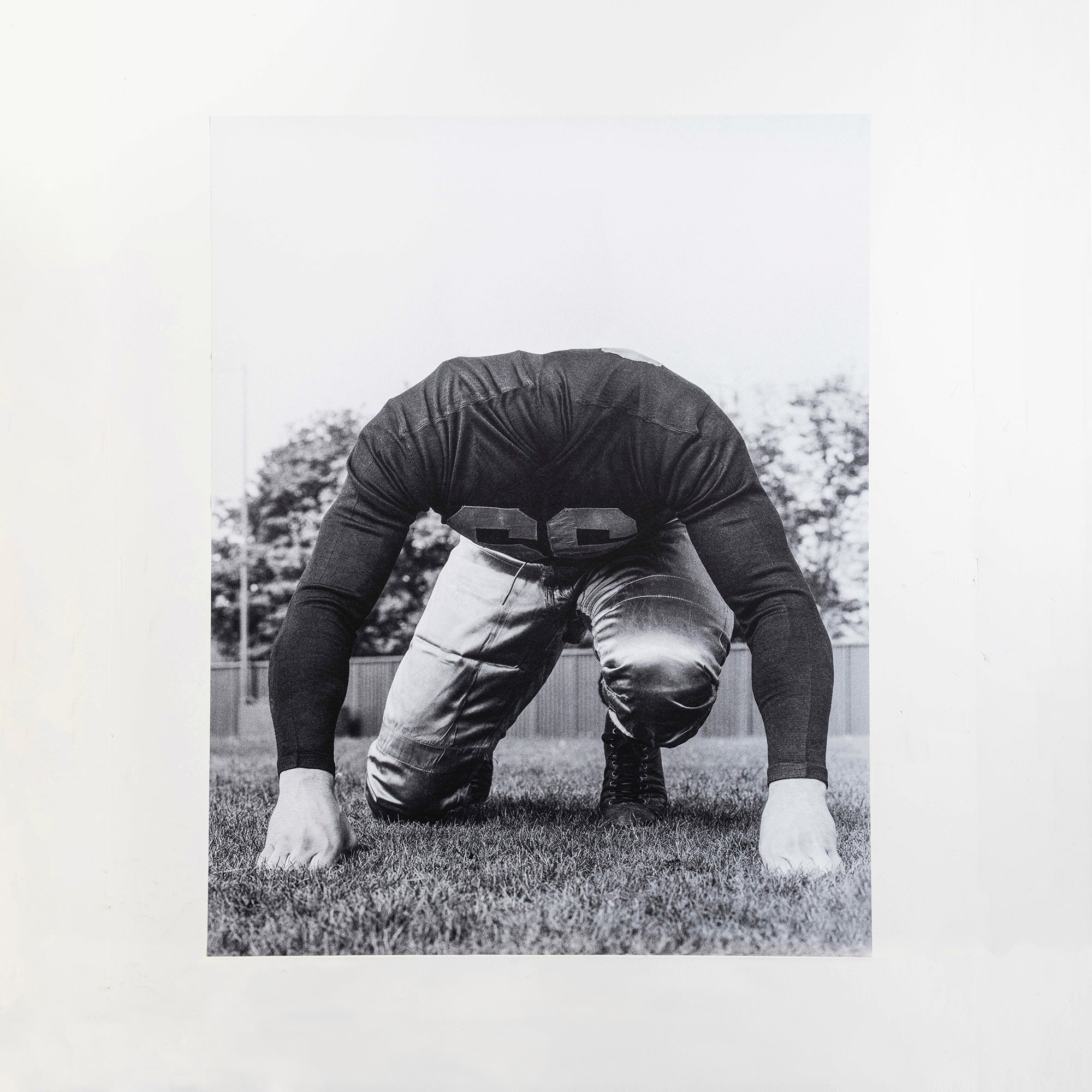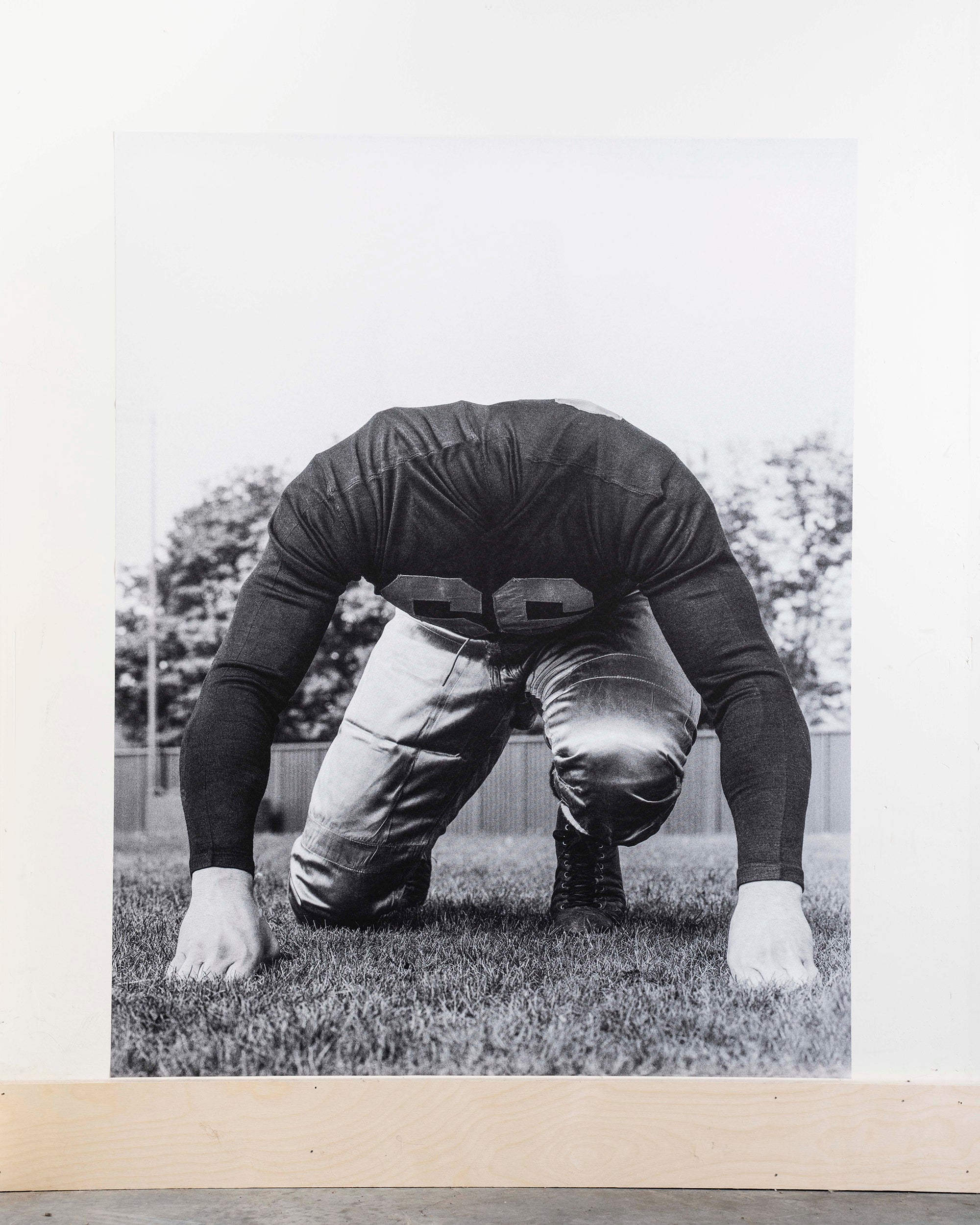FOOTBALL by Birthe Piontek
2025
From the series Zero Hour
Photo Tex print
Full color digital aqueous printing on textile
40 × 50 in
Edition of 1, with artist proof
Work print (WP)
8.5 × 11 in
Open edition
“I am interested in the expansion of the two-dimensional photographic surface. By treating the photograph as an object and bringing it in dialogue with sculptures and assemblages, I aim to question the authoritative and evidential nature of a photograph and draw attention to the fact that an image always only shows a part of an (in the photograph) invisible whole.”
—Birthe Piontek
In the series Zero Hour, Birthe Piontek looks into Germany ’s past to understand a war-ridden and divided present tense, tracing the country's post-WWII history, societal structures and values by looking at photography's role in reconstructing a nation emptied of symbolism and role models after 1945. Combining images from Piontek’s family archive, press images, and constructed still lifes with political transcripts and documents, Piontek seeks to understand how Germany, once the "poster child of peace and democracy”, finds itself entangled in current wars and seduced by a rising national populism.
Piontek visualizes the tangled web of multinational interests and policies related to Germany’s postwar rise to power, influenced predominantly by the United States. Promises, facts, and fiction blend, asking the viewer to re-evaluate our relationship to seemingly well-known narratives, history, and collective and individual memory. It lays bare the inherent biases in such photographs, the invisible layers of inequality and dominant social structures central to western ideals. The images show that social norms like patriarchy, whiteness, and heteronormativity, were reinforced by photography, suggesting that Germany’s democracy and the social-political fabric of the nation were deeply flawed from its inception.
Zero Hour reminds us that history always resides in the present, and democracy can never be taken for granted.
Originally from Germany, Birthe Piontek is a photo-based artist living and working in Vancouver as of Lucid Pleasure’s release. Her photographic practice explores the interconnections between photographic images, objects, history, and personal and collective memory. Much of her approach investigates to what degree our complex identities can be visualized, intending to make visible the invisible but experienced or felt, such as our relationships with vulnerability, anxiety, and belief. While her work is rooted in photography, she often utilizes other art forms such as installation, collage, and sculpture to expand on dialogue with or of the photographic image.
Piontek’s work has been exhibited in solo and group shows in Canada, the United States, Europe, and South America and is featured in many private and public collections, such as the Museum of Contemporary Photography in Chicago and the Museum of Applied Arts in Gera, Germany. She is the author of several photography books. The project The Idea of North won the Critical Mass Book Award in 2009 and was published by Photolucida in 2011. Her project Abendlied received the Edward Burtynsky Grant in 2018 and was nominated by Time Magazine as one of the best photo books in 2019. Her third book, Janus, was published in 2021, and her newest project, Zero Hour, was released in 2025. Piontek received her MFA from the Folkwang University of the Arts in Essen, Germany. She lives in Vancouver, Canada, where she is an Associate Professor of Photography at the Emily Carr University of Art and Design.
Strata shares prints on Photo Tex, a printable textile. We chose this material to offer works by notable photographers at an affordable price. The images don’t need to be framed—you simply peel off the backing and place the print on your wall. Our intent is that more photographs can find their way to homes, offices, and libraries without disrupting the value of archival prints for the artists who make them.
Work prints, also known as WPs, come in various styles—artists use them to work through ongoing projects. They are small and uneditioned.

